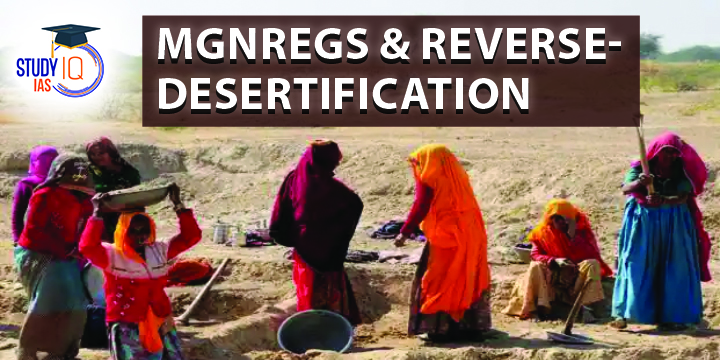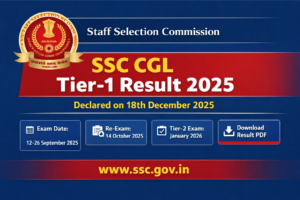Table of Contents
MGNREGS
- The MGNREGS provides a legal guarantee for one hundred days of employment in every financial year to adult members of any rural household ready to do public work-related unskilled manual work at the statutory minimum wage.
- The Ministry of Rural Development (MRD), Govt of India monitors the implementation of the scheme in association with state governments.
- This scheme will improve the purchasing power of the rural people, primarily semi or un-skilled work to people living below poverty line in rural India.
MGNREGS: Background
- Ridge area treatment, drainage line treatment, rainwater harvesting, soil and moisture conservation, nursery raising, afforestation, horticulture and pasture development are works under PMKSY scheme.
- The government has limited funds to restore degraded land and reverse desertification in the country. Hence, the States have been instructed to undertake these activities using MGNREGS funds.
| The United Nations Convention to Combat Desertification (UNCCD):
The UNCCD was adopted in 1994 and is the sole legally binding international agreement to address land management. The convention was a direct recommendation of the Rio Conference’s Agenda 21. The UNCCD has been ratified by the European Union and remaining 196 states. |

MGNREGS: What are the Possible Reasons for this Convergence?
- Fulfilling commitments: India has committed to restore 26 million hectares of degraded land by 2030 following a commitment made during the UN Convention to Combat Desertification (COP14).
- Financial restrictions: The pandemic has put restrictions on the financial spending of the government. It is trying to explore alternative opportunities to fulfil the commitment.
- Using a budget of Rs 73,000 crore under MGNREGS, the government can scale up the area to be covered under the scheme.
- Increase capacity: By converging both the schemes, the government can carry out treatment of about 30% more land than feasible with the current scheme size.
MGNREGS: What is Land degradation?
- Land degradation is the reduction or loss of the biological or economic productivity of soil in a given area.
- Land degradation in India:
- About 30% of India’s total geographical area is under the category of “degraded land”. States such as Jharkhand, Rajasthan, Delhi, Gujarat and Goa have more than 50% of land area undergoing desertification or degradation.
- Kerala, Assam, Mizoram, Haryana, Bihar, Uttar Pradesh, Punjab and Arunachal Pradesh have less than 10% land degradation.
MGNREGS: Reasons for Land Degradation
- Extreme weather conditions: Extreme weather conditions such as droughts, heatwaves and cloudbursts can alter the profile of the soil and degrade them.
- Deforestation: Trees and plants keep the top layer of oil intact. Deforestation erodes the top layer, taking away minerals and organic content.
- Salination: Salination occurs due to accumulation of water-soluble salts in the soil. This may occur naturally or because of improper anthropogenic activities, particularly farming practices.
- Over-irrigation: Excessive irrigation can change the pH of the soil. Changes in pH can alter the nutritional quality of the soil.
PM Krishi Sinchayee Yojana:
- The scheme is a national mission to enhance farm productivity and ensure better utilization of the resources in the country.
- Objectives:
- Convergence of investments in irrigation at the field level
- To expand the cultivable area under assured irrigation
- To improve water use efficiency to reduce water wastage
- To enhance use of precision-irrigation and other water saving technologies (More crop per drop)
- To enhance aquifers recharge and introduce sustainable water conservation practices
- To explore possibility of reusing treated municipal based water for peri-urban agriculture
- Attract greater private investment in a precision irrigation system.


 SSC CGL Tier-1 Result 2025 (Out): Check ...
SSC CGL Tier-1 Result 2025 (Out): Check ...
 Jumping Genes: The Revolutionary Discove...
Jumping Genes: The Revolutionary Discove...
 Nitrofurans: Understanding This Class of...
Nitrofurans: Understanding This Class of...

























